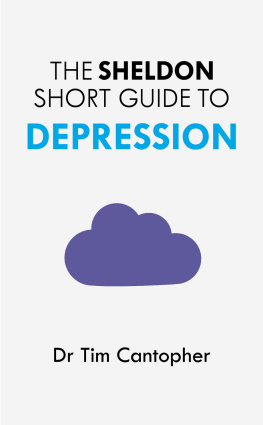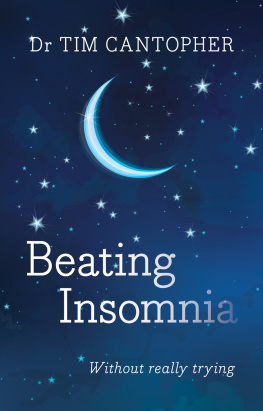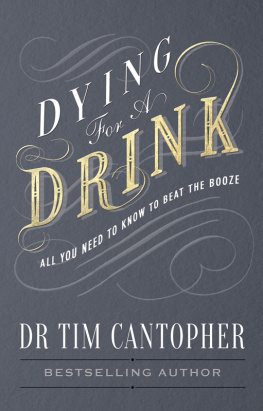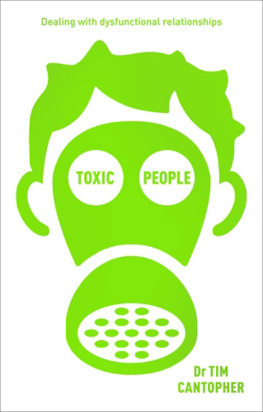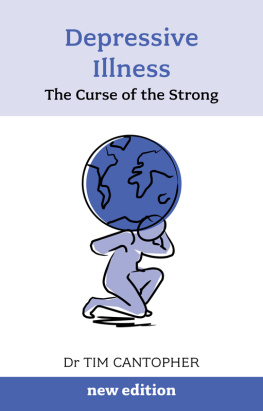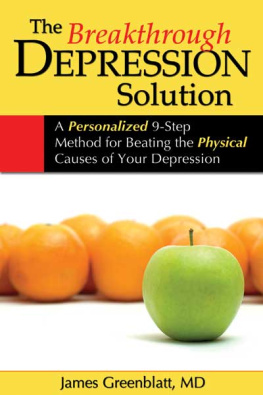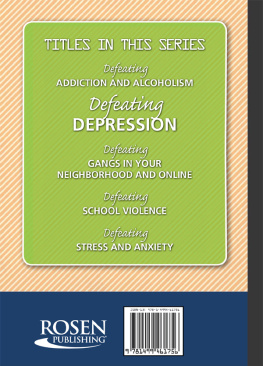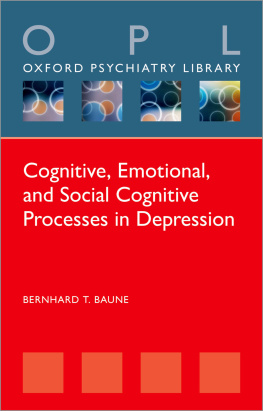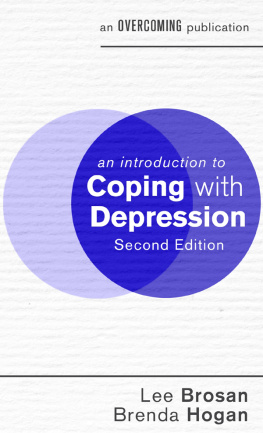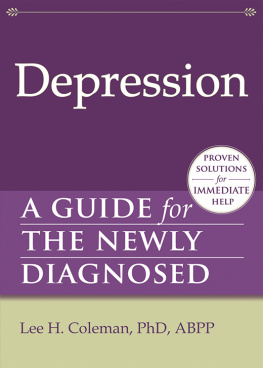
The Sheldon Short Guide to
Depression
Dr Tim Cantopher studied at University College, London, and University College Hospital. He trained as a psychiatrist at St James Hospital, Portsmouth, and St Georges Hospital Medical School. He has been a member of the Royal College of Psychiatrists since 1983 and was elected fellow of the college in 1999. Before his retirement, Dr Cantopher worked as a consultant psychiatrist with the Priory Group of Hospitals for many years, and he has published a number of research projects across the field of psychiatry. He is the author of Stress-related Illness (2007) and Dying for a Drink (2011), both published by Sheldon Press. Dr Cantopher is married with three children.
Sheldon Short Guides
Depression
Dr Tim Cantopher
Memory Problems
Dr Sallie Baxendale
Phobias and Panic
Professor Kevin Gournay
Worry and Anxiety
Dr Frank Tallis
THE SHELDON
SHORT GUIDE TO
DEPRESSION
Dr Tim Cantopher

First published in Great Britain in 2015 by Sheldon Press
An Hachette UK Company
Sheldon Press
Carmelite House
50 Victoria Embankment
London EC4Y 0DZ
www.sheldonpress.co.uk
Copyright Dr Tim Cantopher 2015
All rights reserved. No part of this book may be reproduced or transmitted in any form or by any means, electronic or mechanical, including photocopying, recording, or by any information storage and retrieval system, without permission in writing from the publisher.
British Library Cataloguing-in-Publication Data
A catalogue record for this book is available from the British Library
ISBN 9781847093714
Depressive illness is not a psychological or emotional state and is not a mental illness. It is not a form of madness. It is a physical illness.
This is not a metaphor; it is a fact. Clinical (severe, persistent) depression is every bit as physical a condition as pneumonia or a broken leg. If I were to perform a lumbar puncture on my patients (which, new patients of mine will be pleased to hear, I dont), I would be able to demonstrate in the chemical analysis of the cerebro-spinal fluid (the fluid around the brain and spine) a deficiency of two chemicals: serotonin and noradrenaline. These are normally present in quite large quantities in the brain, and in particular in one set of structures.
The limbic system
The structures concerned are spread around various parts of the brain, but are linked in the form of a circuit called the limbic system (see , overleaf).
This simplified diagram shows one chain of nerve fibres. The whole system consists of millions of such chains with complex inputs and outputs, which are not shown.
The limbic system controls a lot of the bodys processes, such as sleepingwaking cycles, temperature control, temper control, eating patterns and hormones; every hormone in the body is directly or indirectly under the control of the limbic system. It keeps all of these functions in balance with each other. The limbic system is essentially a giant thermostat or reverberating circuit, controlling many functions at once. Its most important function is to control mood.
It normally does this remarkably well. A human beings mood is usually very stable. For example, if you win a million pounds on the lottery, your mood does indeed rise, for a few days. It then returns to normal, with occasional peaks, mostly in the first few weeks, corresponding with buying your first Ferrari and the like. So mood isnt controlled consistently by events or the quality of your life, but by the limbic system.
But like every other system and structure in the body, it has a limit. If you bash a bone hard and consistently enough, it will break. So will the limbic system.
It can be caused to malfunction by a number of different factors. These include viral illnesses such as flu. Other precipitants of limbic system dysfunction are hormonal conditions, illicit drugs, too much alcohol, some prescribed medicines, too many major life changes, too many losses or facing choices involving conflicting needs. By far the commonest trigger, though, is stress.
The synapse
Whatever the cause, the end result is the same. If the limbic system is taken beyond its design limits, it will malfunction. The part of the limbic system that goes is the gap between the end of one nerve and the beginning of another, or the synapse , as shown in . There are millions of these in the limbic system and they are the most vulnerable part of the circuit.
Transmitter chemicals , or neurotransmitters, are chemicals that transmit signals from one neuron or nerve cell to another via the synapses, the site where the neurons meet. Transmitter chemicals include serotonin and noradrenaline, both believed to be implicated in the maintenance of mood. In clinical depression it is these transmitter chemicals that are affected. In response to stress or any of the other triggers listed above, the levels of these chemicals in the synapses of the limbic system plummet, and the limbic system grinds to a halt.
When the limbic system stops functioning, a characteristic set of symptoms arises. These symptoms are what define clinical depression and separate it out from other states, such as sadness, disgruntlement or stress. Most of these symptoms are under the heading of loss of. Its pretty much a case of loss of everything it is as if the whole body shuts down.
Cortisol
The symptom of feeling worse in the morning is a particular marker for depressive illness and is caused by a hormonal change. Under normal circumstances the level of the hormone cortisol fluctuates through the day, with a high peak in the early morning and a gradual falling-off through the day until, by the evening, there is very little in circulation. However, in depressive illness, this morning peak is lost. Thus you feel worse in the morning. This is one demonstration, if there were any doubt, that depressive illness really is physical.
Who gets depressive illness?
One more important fact: depressive illness, or at least the commonest form, which is that caused by stress, nearly always happens to one type of person. He or she will have the following personality characteristics:
Symptoms in clinical depression
Feeling worse in the morning and better as the day goes on.
Loss of:
sleep (usually early morning waking)*
appetite*
energy
enthusiasm
concentration
memory**
confidence
self-esteem
sex drive
drive
enjoyment
patience
feelings
hope
love
and almost anything else you can think of.
* Both sleep and appetite can occasionally be increased, rather than decreased.
** Loss of memory is, in fact, apparent rather than real. What actually happens is that you cant concentrate during a depressive episode, so you dont take information in properly. Therefore the information isnt available later to recall.
(moral) strength
reliability
diligence
a strong conscience
a strong sense of responsibility
a tendency to focus on the needs of others before ones own
sensitivity
vulnerability to criticism
self-esteem dependent on the evaluation of others.
This person is the sort to whom you would turn if you had a problem to sort out upon which your life depended. She is a safe pair of hands and you can trust her with anything. Indeed, this person is usually admired, though often somewhat taken for granted by those around her. People are usually very surprised when she gets ill; indeed, she is the last person you would expect to have a breakdown.
Next page
